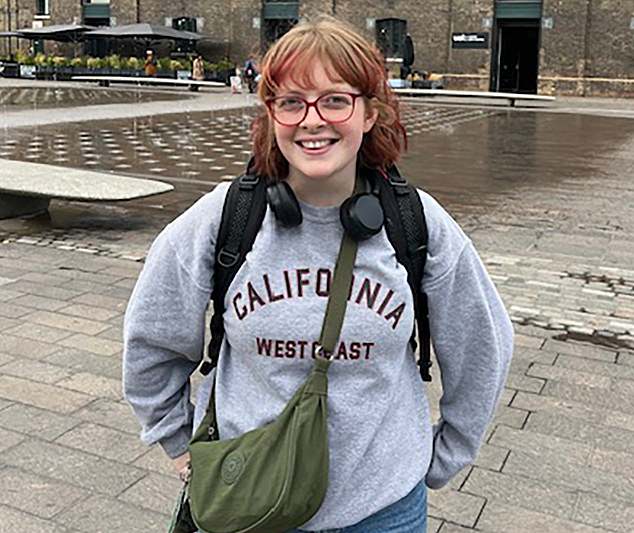When six-year-old Florence Marston-Bolton began suffering knee pain, her parents had no reason to believe there was a serious problem.
It followed a bout of flu and, she recalls, it left her unable to take part in sport at school or play with her friends at break time.
Doctors initially told her parents the pain would pass in a few weeks. But five years later – and countless trips to her GP – Florence was still in agony.
‘I remember being in so much pain,’ says the art student, now 19. ‘I’d beg my mum to take me to the hospital, but doctors never had any answers.
‘As a kid it was hard to explain how I was struggling and the impact it was having on me.
‘I would be labelled a hypochondriac and lazy for not being able to take part in things, and it began to have a real impact on me mentally – it was really isolating.’
Eventually, Florence’s mum demanded to see a specialist and the real cause was revealed – juvenile idiopathic arthritis (JIA), a painful autoimmune disorder that attacks the joints.
The diagnosis, says Florence, was a relief.

The diagnois was a huge relief for Florence, now 19
She now manages her condition through medication and physiotherapy, but doctors have told her the delays in diagnosis have had long-term impacts.
‘Because of repeated flare-ups without medication, my knees are now bent inwards, which I cannot change,’ she says. ‘It causes problems walking at times and I suffer from hypermobility [joints have a greater range of motion than usual], which doctors have also said could have been caused by being undiagnosed for so long.’
Experts say she is not alone, and that a number of children with JIA are going undiagnosed – which can have lifelong consequences.
‘Juvenile idiopathic arthritis can be really challenging to diagnose,’ says Dr Gavin Cleary, consultant paediatric rheumatologist at Alder Hey Children’s Hospital in Liverpool. ‘This is because it is often mistaken for an infection or an injury, and the trouble is that if it is left undiagnosed it can result in irreparable damage to the joints.’
A report this year by the National Confidential Enquiry into Patient Outcome and Death, which reviews clinical practice, examined the treatment of JIA. It concluded: ‘Lack of awareness among health professionals of JIA is resulting in children bouncing around the NHS, and diagnosis was too often based on luck.’
The report found just one in five GP practices had a protocol for the investigation or treatment of youngsters with the condition.
It is estimated that there are 12,000 children under 16 in the UK with JIA – the equivalent of one in 1,000 children.
JIA is a chronic disease and, despite its name, youngsters do not outgrow it, as was once believed. The majority will continue to have it into adulthood.
The cause is unknown, although infections may trigger the immune system to become overactive in some people, which in turn can lead to inflammation. It results in pain, stiffness and swelling in the joints, and can be debilitating.
Experts say there is clear advice for parents who are concerned that their child may be suffering from JIA.
‘If your child appears stiff, especially in the morning – but also if they are complaining of it impacting their day at school – as well as having a limp that cannot be explained by injury and a change in their ability to do day-to-day tasks, particularly gripping things with their hands, then you should see a doctor,’ says Dr Cleary.
‘If these symptoms persist, then JIA should be on your radar and you should ask for a referral to a paediatric rheumatologist.’
Campaigners warn that the condition is still being misdiagnosed and are calling for greater support for children to prevent lasting problems.
Lynne Woolley, head of young people and families service at the charity Arthritis UK, said: ‘As a service supporting children and young people living with arthritis, we hear all too often that there was a significant delay in diagnosis. Young people with JIA and their families often don’t feel they’re taken seriously.
‘They’re passed from doctor to doctor – living in uncertainty, worry and pain. Left untreated, arthritis can significantly impact a child or young person’s physical health, including irreversible damage to the joints and eyes. Mental health can also suffer.
‘And this all comes at a key time in their life when their bodies are growing, when they should be able to focus on learning, playing, growing in confidence and getting ready for adult life.
‘That’s why Arthritis UK invests in life-changing research to better understand the causes of arthritis and to improve treatment. We also work directly with healthcare
professionals by providing training to improve their knowledge and confidence in diagnosis.
‘For those affected, we offer trusted information, guidance
and support for all young people and families newly diagnosed through our Young People and Families Service.’
This article was originally published by a www.dailymail.co.uk . Read the Original article here. .

